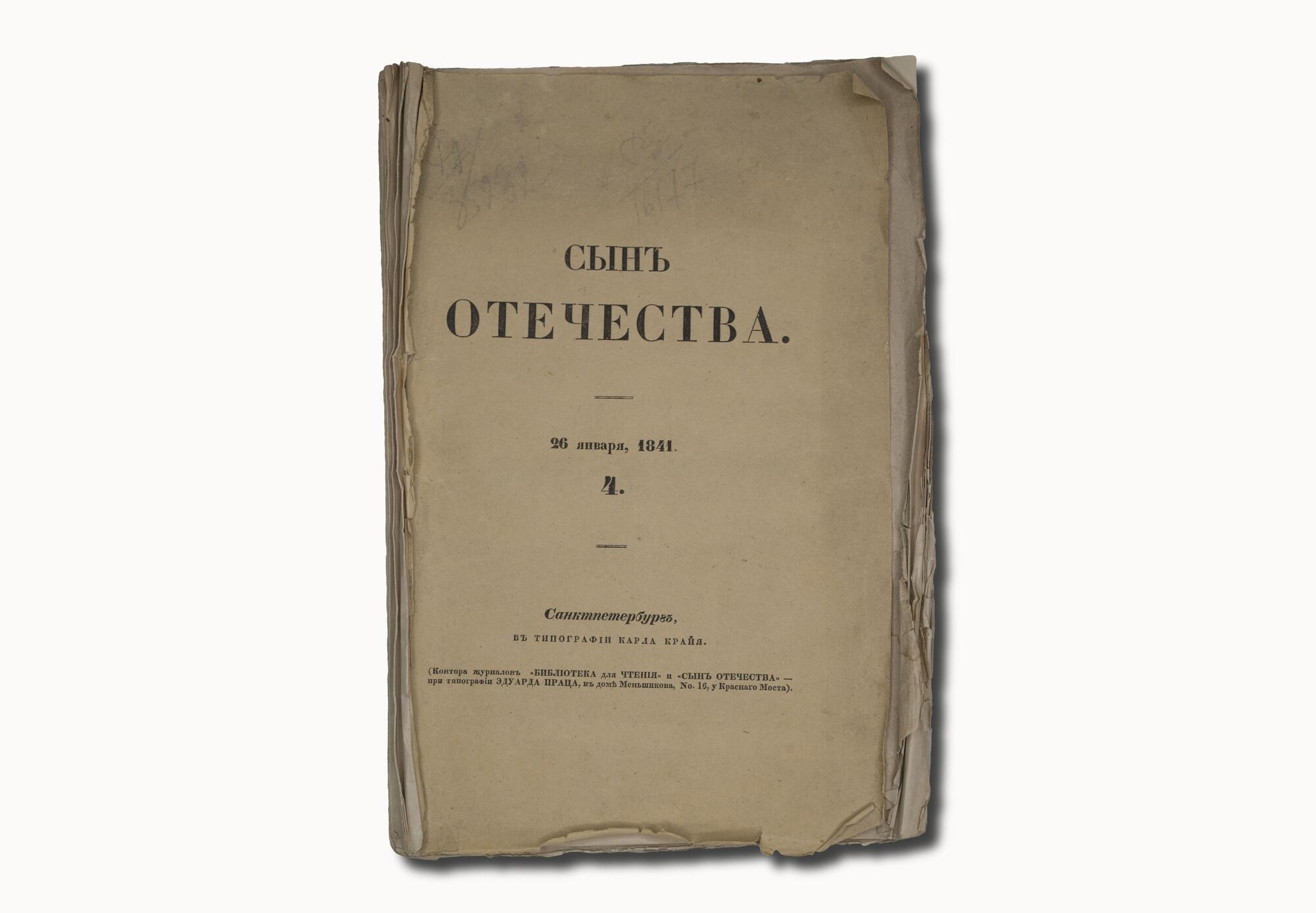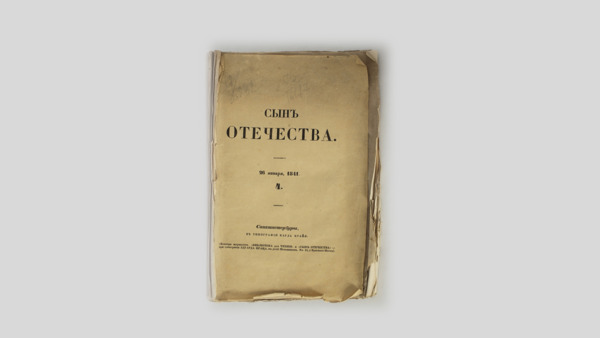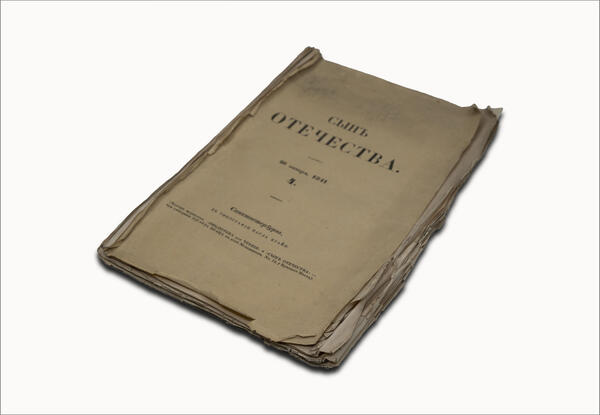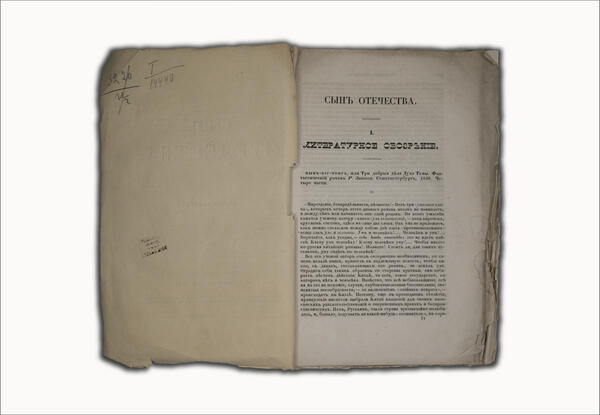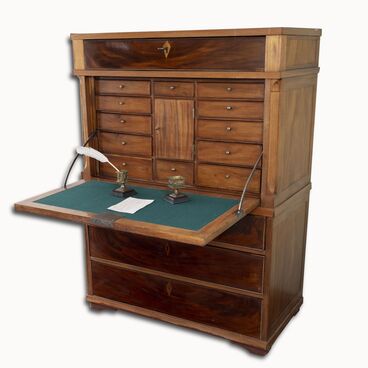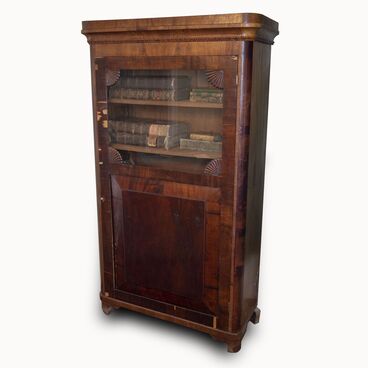Magazines and newspapers played quite an important role in Russia. The tradition of constant reading was formed thanks to their consistent editions, accessible narrative, and regular columns.
The “Syn Otechestva” which name translates as “Son of the Fatherland” was a Russian historical, literary and socio-political magazine of the 19th century. It was published at intervals from 1812 to 1852 in Saint Petersburg and was influential in the development of social thought and literature in Russia. Another magazine of the same name was published from 1856 to 1861 and an eponymous newspaper was published from 1862 to 1901.
The weekly magazine was published on Thursdays. The magazine was edited and published by Nikolay Ivanovich Gretsch, who also worked as a teacher of literature at the Saint Petersburg gymnasium and secretary of the censorship committee. At first, “Syn Otechestva” was a historical and political magazine, but it also featured literary works, mostly poetry and mainly on current political and military topics, such as Alexander Pushkin’s poem “Napoleon on the Elbe” published in 1815. The magazine also had illustrations, mostly cartoons.
The magazine also printed soldier’s and folk songs, as well as Ivan Krylov’s fables and articles by Alexander Kunitsyn and Ivan Kaydanov. In the early years, the magazine collaborated with Alexander Voeykov, Konstantin Batyushkov, Nikolay Gnedich, and Gavriil Derzhavin. From 1816 to 1825, members of the Decembrist organizations gained influence in the magazine, which started to publish poems by Vasily Zhukovsky, Anton Delvig, Pyotr Pletnyov, Mikhail Milonov, Alexander Bestuzhev, Alexander Pushkin, Pavel Katenin, Wilhelm Küchelbecker, Fyodor Glinka, as well as articles by Pyotr Vyazemsky, Alexander Griboyedov, Orest Somov, Kondraty Ryleyev, Alexander Bestuzhev, and Nikolay Kutuzov. Until 1825, the “Syn Otechestva” was one of the most influential and popular Russian magazines.
After the Decembrist Revolt, the “Syn Otechestva” magazine drastically changed its political affiliation and soon lost its reputation as one of the best periodicals. Its pages were filled with translated fiction, and the literary criticism was deteriorating. In 1825, Nikolay Gretsch invited Thaddeus Bulgarin as co-editor. In 1829, the magazine merged with Bulgarin’s journal called “Severny Arkhiv” (Northern Archives).
The “Syn Otechestva” which name translates as “Son of the Fatherland” was a Russian historical, literary and socio-political magazine of the 19th century. It was published at intervals from 1812 to 1852 in Saint Petersburg and was influential in the development of social thought and literature in Russia. Another magazine of the same name was published from 1856 to 1861 and an eponymous newspaper was published from 1862 to 1901.
The weekly magazine was published on Thursdays. The magazine was edited and published by Nikolay Ivanovich Gretsch, who also worked as a teacher of literature at the Saint Petersburg gymnasium and secretary of the censorship committee. At first, “Syn Otechestva” was a historical and political magazine, but it also featured literary works, mostly poetry and mainly on current political and military topics, such as Alexander Pushkin’s poem “Napoleon on the Elbe” published in 1815. The magazine also had illustrations, mostly cartoons.
The magazine also printed soldier’s and folk songs, as well as Ivan Krylov’s fables and articles by Alexander Kunitsyn and Ivan Kaydanov. In the early years, the magazine collaborated with Alexander Voeykov, Konstantin Batyushkov, Nikolay Gnedich, and Gavriil Derzhavin. From 1816 to 1825, members of the Decembrist organizations gained influence in the magazine, which started to publish poems by Vasily Zhukovsky, Anton Delvig, Pyotr Pletnyov, Mikhail Milonov, Alexander Bestuzhev, Alexander Pushkin, Pavel Katenin, Wilhelm Küchelbecker, Fyodor Glinka, as well as articles by Pyotr Vyazemsky, Alexander Griboyedov, Orest Somov, Kondraty Ryleyev, Alexander Bestuzhev, and Nikolay Kutuzov. Until 1825, the “Syn Otechestva” was one of the most influential and popular Russian magazines.
After the Decembrist Revolt, the “Syn Otechestva” magazine drastically changed its political affiliation and soon lost its reputation as one of the best periodicals. Its pages were filled with translated fiction, and the literary criticism was deteriorating. In 1825, Nikolay Gretsch invited Thaddeus Bulgarin as co-editor. In 1829, the magazine merged with Bulgarin’s journal called “Severny Arkhiv” (Northern Archives).
